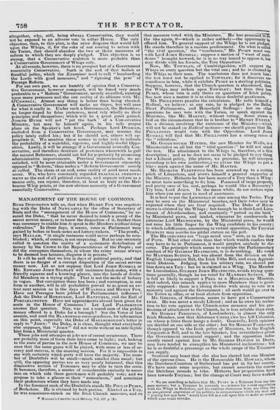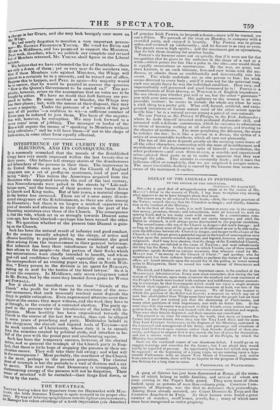MANAGEMENT OF THE HOUSE OF COMMONS.
BUBB DODINGTON tells us, that when HENRY Fox was negotiat- ing with the Duke of NEWCASTLE for the office of Secretary of State and the "management of the House of Commons," he as- sured the Duke, " that he never desired to touch a penny of the secret service money, or to know the disposition of it, further than was necessary to enable him to speak to Me Members without being ridiculous." In those days, it seems, votes in Parliament were gained by bribes in bank-notes and lottery-tickets. "The proofs," says HA.LLAM, "in single instances could never perhaps be esta- blished; which, of course, is not surprising. But no one seriously called in question the reality of a systematic distribution of money by the Crown to the Representatives of the People ; nor did the corrupters themselves, in whom the crime seems always to be deemed less heinous, disguise it in private:** It u ill be said that we live in days of political purity, and that there is no danger of a corrupt disposition of the secret service money now. Let us not suppose that Lord JOHN RUSSELL or Mr. EDWARD JOHN STANLEY will insinuate bank-notes, with a friendly squeeze and a knowing glance, into the hands of doubt- ful Members on a trying night. That is not the mode of bribery in vogue. But corruption there has been ; and corruption, in one form or another, will in all probability prevail to as great an ex- tent next session as in the days of WALPOLE and HENRY Fox. Have not Peerages been jobbed for Parliamentary influence ? Ask the Duke of ROXBURGH, Lord RANFURLY, and the Earl of PORTARLINGTON. Have not appointments abroad been given fur seats in the House of Commons ? Let Lord PALMERSTON answer that question. Nay, was not a round sum of the public money offered to a Duke for a borough ? See the Votes of last session, and read the BLANDFORD correspondence, for information on this point, especially the Duke of MARLBOROUGH'S letter in reply to "Rom " the Duke, it is clear, thought what everybody else supposes, that "JOHN" did not write without an intelligible hint from a Ministerial quarter.
These jobs and attempts at jobs are of recent occurrence. There are probably more of them than have come to light ; and, looking to the state of parties in the new House of Commons, we may be sure that the same game will be played, with more or less of se- crecy and success, in the ensuing session. For it is impossible to say with certainty which party will have the majority. The num- ber of Doubtfuls will be small—much smaller than usual; but still, the opposing parties are so very nearly balanced, that this diminutive section of Trimmers may be able to turn the scale. It becomes, therefore, a matter of considerable curiosity to aseeta lain on which side these gentlemen will probably vote; and we propose to take a glance at their "antecedents," and scrutinize their professions where they have made any
In the foremost rank of the Doubtfuls stands Mr. PHI LIP PUSEY, of Berkshire. He is claimed by both parties. Elected as a Tory, be was conscience-struck on the Irish Church measure, and on UALLA)1.9 CoMtituCoial History, Vol. III, p.:13. that measure voted with the Ministers.— He-has prom- is—ed-ftrs the like again, if—which is rather unlikely—the opportunity be offered him. To general support of the Whigs be is not pledged, He stands therefore in a curious predicament. On what is called "the vital question," the "touchstone," Mr. PUSEY must vote with Lord JOHN RUSSELL : suppose a motion of " want of confi- dence " brought forward, he is in no way bound to oppose it, but may divide with his friends, the Tory Opposition.* Now, Mr. TOWNLEY, of Catnbridgeshire, will support the Whigs on every question but the vital one ; and he is claimed by the Whigs as their man. The touchstone does not touch him: the test must not be applied to ToWNLKY; for it discovers an. soundness in him, while it exhibits PUSEY as a sterling politician, Suppose, however, that the Church question is abandoned, thee the Whigs may reckon upon TOWNLEY; but then they lose PUSEY, whose vote is only theirs on questions of Irish policy,. See how nice a matter it is to class these doubtful gentlemen. Mr. PHILLPOTTS puzzles the calculators. He calls himself a Radical, we believe : at any rate, he is pledged to the Ballot, Short Parliaments, and Household Suffrage : but on other questions he may vote with the Tories, or speak against the Ministers, like Mr. HARVEY, without voting. Some stress is laid on the circumstance that he is brother to " HENRY EXETER; On a division involving the existence of the Ministry—which will not be staked on Radical motions—we should guess that Hr. PHI LLPOTTS Would vote with the Opposition. Lord JOHN RUSSELL will find that Mr. PHILLPOTTS has a strong sense of the " ridiculous."
Mr. GOODENOUGH HAYTER, the new Member for Wells, is a Ministerialist on all but the " vital question :" he will not stead the test. His attachment to the Whigs is, therefore, of a thin description ; and as he does not seem to be pledged to itoy thing but a Liberal policy, (the phrase, we presume, he will interpret according to his own inclination,) we advise the Whigs to put a lilac': mark against the name of Mr. HAYTER.
Mr. HESKETH FLEETWOOD has been screwed up to a certain pitch of Liberalism, and avows himself a general supporter of the Ministry. Hitherto he has been more of a Tory than a Whig: he must have something to fix him. Possessed of large property, and pretty sure of his seat, perhaps he would like a Baronetcy ? Try him, Lord Jomsr. In the mean while, do not reckon upon him when you are most in need of assistance. It is best to put the LENNOXES at once among the Tories. They may be seen on the Ministerial benches, and their votes may be expected when they are least required. The Duke of RICH- MOND is claimed by the Whigs ; but though he is their Lord-Lieu- tenant of Aberdeenshire, and constantly " patted on the back" by Ministerial paws, and lauded, whenever he condescends to patronize Lord MELBOURNE, by the Ministerial press, he would not raise his little finger for the Whig candidate in his county; to which indifference, amounting to virtual opposition, Sir THOMAS BURNETT may ascribe his pitiful station on the poll. The HEATHCOTES are " large-acred men" now, as in the days of POPE. What other claim than that which wealth confers they may have to be in Parliament, it would perplex anybody to dis- cover. The principle which seems to regulate the Parliamentary conduct of Sir GILBERT HEATHCOTE, is to do nothing. He voted for MANNERS SUTTON, but was absent from the division on the English Corporation Bill, the Irish Tithe Bill, and even Agricul- tural Distress. Judging from his solitary vote, we should put him down as a Tory : but he is claimed as a Whig. The Member for Lincolnshire, GILBERT JOHN HEATHCOTE, avoids trying ques- tions generally, though he too voted for MANNERS SUTTON. He is full as likely to support a PEEL as a MELBOURNE Ministry. And indeed, this remark applies to more Members than is gene- rally supposed : there is a strong dislike with many to vote in a minority and against the Government : all such would go over to the Tories in office, or at least abstain from opposition. Mr. GORING, of Shoreham, seems to have got a Conservative twist. He was never a steady Liberal ; and as he owes his reelec- tion to his vote against the Church-rates measure and his pro- fessions of' attachment to the Church, he is less reliable than ever.
Sir ROBERT FERGUSON, of Londonderry, is almost the only Irish Member, now that Alderman COPELAND has left Coleraine, on whose politics there hangs a doubt. Generally, Irish opinions are decided on one side or the other; but Sir ROBERT FERGUSON, though opposed to the Irish policy of Ministers, to the English Corporation Bill, and to the late Speaker, has nevertheless given the Government occasional support ; and the opposition indis- creetly raised against him by Mr. GEORGE DAWSON in Derry, may have tended to strengthen his Ministerial inclinations ; but he is as doubtful a personage as the whole range of the Trimmers can supply.
Scotland may boast that she also has elected but one Member of the epicene class. He is the Honourable Mr. Howartn, whom the Dutchess-Countess of Sutherland has put in for her county. We have made some inquiries, but cannot ascertain the course the Dutchess intends to take. Hitherto her propensities have been towards Toryism; but the change at Court may have worked
* We are unwilling to believe that Mr. PUREV is a Trimmer from any pure motive; but a Trimmer he certainly is—witness his recent negenanon with the Whigs in Berkshire, and his cautious abstinence from any thing like an unequivocal expression of his politics, in circumstances which any man not playing fast and loose" would have felt as a call upon him to make an avowal which none could mistake. • ebaage in her Grace, and she may look benignly once more on tbe we had nearly forgotten to mention a very important person- e..-Mr. GEORGE FREDERICK YOUNG. He voted for BYNG and ;font in Middlesex, and has promised to support the Ministers. Not week, therefore, when we publish our complete and revised list of Members returned, Mr. Yousse shall figure in the Liberal column. We believe that we have exhausted the list of Doubtfuls—there are Loy a dozen of them ; yet so very near do the numbers run, that if these Members vote against Ministers, the Whigs will almost to a certainty be in a minority, and be turned out of office. SupPose this to happen, and PEEL in again—his majority would be so narrow, that he would be puzzled to answer the question blow is the Queen's Government to be carried on?" The per- plexity, however, arises on the assumption that no votes are to be bought by either. We have no doubt that both factions are pre. pared to bribe. By some accident or blunder, the Whigs may lose their places ; but, with the means at their disposal, they may secure a majority. ,Under the pretence of a" union of the good men of all parties —a coalition to wit—a sufficient number of Dries may be induced to join them. The basis of the negotia- tion will, however, be corruption. We may look forward to a wen years' term of jobbing. The manager or leader of the Howe will require the means of" speaking to Members without being ridiculous;" and he will have them—if not in the shape of bauk-notes, in some other form equally effectual.



























 Previous page
Previous page